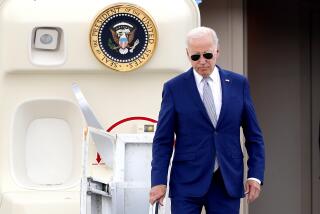An Asian Tightrope for Bush
- Share via
President Bush leaves Saturday for a weeklong trip to Japan, South Korea and China. All three deserve the president’s thanks for supporting his war on terrorism. Then Bush must show Olympic-caliber balance as he skates between public and private diplomacy.
At the United States’ urging, Japan has its warships out patrolling the Indian Ocean in support of coalition forces fighting in Afghanistan. But at home, it is suffering a decade-long economic stagnation that threatens to spread across Asia and the Pacific. Prime Minister Junichiro Koizumi now appears less the economic reformer than he claimed to be in campaigning for office. Bush should stress the need for systemic reform, especially in the banking sector, and offer support for Koizumi’s original plans to overhaul the Japanese economy. Cowboy swagger won’t cut it, though. Too blunt and public a lecture would only embolden economic reform’s conservative opponents.
Bush’s second stop is South Korea, home to 37,000 U.S. troops, many of them close to the border with North Korea, one of the nations the president described as an “axis of evil” in his State of the Union speech. The troops provide visible evidence of the mutual interest of Asia and the United States in regional stability.
President Kim Dae Jung won a Nobel Peace Prize in 2000 for trying to start the reunification of the two Koreas nearly half a century after the Korean War. Unfortunately, North Korea has not lived up to its end of a deal, and public opinion has turned against Kim in South Korea. Last year, during Kim’s White House visit, Bush expressed skepticism about North Korean intentions, embarrassing the South Korean leader.
Bush and Kim both want North Korea to fulfill its international obligations. Both want the Stalinist regime to change course and allow international inspectors to verify that it is not developing nuclear weapons. The question is how best to use leverage of the United States, Japan and South Korea, which have joined to provide the money, food and oil that North Korea desperately needs.
On his next stop, China, Bush should urge Beijing--one of North Korea’s few allies--to lean on Pyongyang to reopen talks with the South and reduce tensions. He should also bring up China’s need to comply with regulations of the World Trade Organization, which it joined two months ago.
In addition, U.S. officials ought to meet with the men expected to succeed President Jiang Zemin and other leaders within the next year; diplomacy aside, the U.S. commitment to religious freedom, human rights, an end to repression in Tibet and peaceful settlement of differences with Taiwan should be stressed. It is no help that China Thursday detained 40 Western followers of the outlawed religious movement Falun Gong in Tiananmen Square.
Three decades have passed since President Nixon’s historic visit to China and more than a dozen years since Chinese troops slaughtered democracy activists during demonstrations in Tiananmen Square. In recent months, relations with China have been back on a more even keel; the visit is a chance to remind Beijing of what it takes to preserve a mutually positive relationship.
More to Read
Sign up for Essential California
The most important California stories and recommendations in your inbox every morning.
You may occasionally receive promotional content from the Los Angeles Times.










